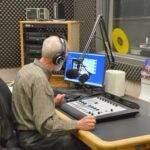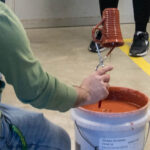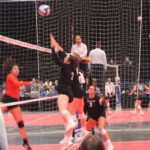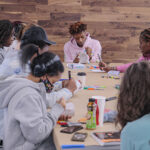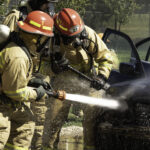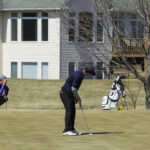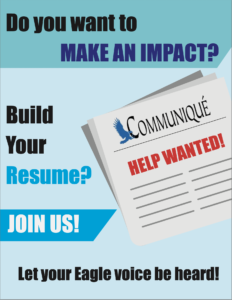“Learn because you love learning. Become a nurse because you are empathetic, want to help people in their most vulnerable moments, and because it challenges you without consuming your life.”
Hannah Wyland came to Iowa to pursue a career in academia. While earning her Master’s Degree in Cognitive Psychology, she realized that her career goals would only fulfill her intellectually and did not actually match her real-life goals for her future.
Wyland said, “I began to realize that while I loved what I did, it was lacking the things I needed for a work-life balance. I wanted to be able to live anywhere, to always have the option of furthering my education. I wanted to work closely as part of a team and I wanted to have a sense of accountability.”
Switching lanes, Wyland said she began working as a nursing assistant at the Veterans Affairs Hospital in Iowa City. While working there, she attended Kirkwood Community College to fulfill her prerequisites for the University of Iowa’s nursing program. After some setbacks with residency requirements at the University of Iowa, Wyland’s journey to nursing took her longer than she wanted.
To future students, Wyland said, “I would emphasize making a plan. Figure out what classes you need and when you need to have applications done. You can do this, but it won’t always be easy.”
After loving her Kirkwood experience, Wyland said she successfully completed her two-year nursing program at the University of Iowa in the fall of 2020.
Her advice to future nursing students is to begin working at a hospital or somewhere in the nursing field. “I was able to apply concepts from school more readily because I had seen patients with the conditions we were talking about. I had many ‘ah-ha’ moments when I made connections between a disease and the presentation of it in a particular patient,” she said.
Celebrating the location, the variety of teachers, and a connection to Kirkwood, Wyland said her experience was much more than she expected, and she has a newfound appreciation for community colleges.
Now equipped with two Bachelor’s degrees, Master’s degree, a registered nurses license, and the experience of working at the VA, Wyland, is looking forward to continuing her career at the VA for now and then moving on to critical care units. Through time and dedication to her studies, she said she’s found a love for learning, community colleges and helping people who need it the most.
- Tell me about your journey to becoming a nurse.
It was a long one, but looking back I wouldn’t change any of it. I went to a small liberal arts college immediately after high school back in NY. It was a fantastic experience and I found a passion for research psychology. After I graduated, I came to Iowa to continue my education and work towards a graduate degree. Around the time I got my Master’s, I realized that the path I was on would fulfill me intellectually, but that it didn’t otherwise match what I needed from a career. My brother and a close friend are both nurses and I realized that the way they talked about their career was very close to what I wanted. I started working at the VA hospital as a nursing assistant and began taking prerequisite classes at Kirkwood. It took a little longer than expected because I had some residency issues to work out, but I was accepted into the University of Iowa’s nursing program. Two short years later, I’ve graduated and am practicing as a Registered Nurse!
- What influenced your career choices?
Figuring out that I didn’t love the career path I was on was huge. I had been used to the direct route I was on toward an academic career and wasn’t questioning it much. I began to realize that while I loved what I did, it was lacking the things I needed for a work-life balance. I wanted to be able to live anywhere, to always have the option of furthering my education. I wanted to work closely as part of a team and I wanted to have a sense of accountability.
I’d be making a major omission if I didn’t mention how big of a role Dessie had in my decision. She is so smart and clever and I knew that a) if Dessie loved nursing I could, and b) if Dessie thought I could be happy as a nurse, she was right. Not to say that I aspire to be Dessie, but I think we have some similar traits that make nursing a really good fit.
- What made you choose Kirkwood for completing your prerequisites?
Initially it was out of convenience. I wanted to attend classes in person and I didn’t want to spend a fortune or travel. I was able to sign up quickly, the credit would transfer easily, and it was just around the corner from home. I don’t really like that answer because I don’t think it gives enough credit to my fantastic Kirkwood experience.
- What challenges did you face while attending Kirkwood?
I was working half-time at night. That made for some days where I would go from work to class without sleep. That was probably the biggest hurdle.
- What was your biggest success at Kirkwood?
Even now, I think about how much I learned and am still surprised. I think the value of Community Colleges is underrated. It felt like a pure form of learning. The professors wanted students to learn; not learn everything but learn the foundations and understand the most important information. That hasn’t been the case in some other academic settings where the amount of information being taught was too much and the teaching techniques weren’t as thoughtful. I learned important information, know how to apply it and continue to find it relevant to my career.
- Give some advice to another Kirkwood student who plans to become a nurse:
Start working as a nursing assistant! I was able to apply concepts from school more readily because I had seen patients with the conditions we were talking about. I had many ah-ha moments when I made connections between a disease and the presentation of it in a particular patient. I would also emphasize making a plan. Figure out what classes you need and when you need to have applications done. You can do this, but it won’t always be easy.
OH! Learn how to study. This is not a career you should memorize content for. For the sake of patient safety and your own competence, you need to learn and understand the nursing material. Figure out how you learn best and use that to study. Tests are good tools for ensuring that you know the information. The content builds on itself, so in order to do well later, you need to iron out the basics right from the beginning.
- What do you wish you would have known then that you know now about going back to school?
It will probably take longer than you expect. With deadlines and application dates, you might not get through as quickly as you want to. Take your time, get experience, and enjoy the learning.
- Where do you want your career to take you?
I think the most important thing from me is that I am always feeling challenged. I genuinely love to learn. I want to go wherever I need to so that I feel challenged and stimulated.
I currently work at the VA and that has been wonderful. I am currently working nights. That is giving me the opportunity to figure out my process in a slower paced environment. Eventually, I will want to be on dayshift so I can be a part of those processes. From there I will determine where to go so I can learn more. I never want to feel like I know it all (because there is absolutely no chance that is true).
- When you think about the nursing profession as you know it now, what do you like the most about it?
I really like people. I am empathetic which can make it hard to see people having bad days. I am learning not to carry that pain myself, but I love being there for patients and letting them know they are safe and that we care. I am fulfilled by working with others. I am also very excited about my opportunities for growth and development. There are so many things I can do!
- What do you want to learn more about in your field?
I see myself working in critical care eventually. I think that continuing to develop my critical thinking and assessment skills is important. I am working on absorbing the things I see at work. By connecting signs and symptoms to potential causes, I am learning what to look for and what is a change versus a meaningful change.
- Is there anything else we haven’t covered that you would like to add?
I loved going to Kirkwood. It was such a pleasant surprise. I want to emphasize that.
Categories: Feature

